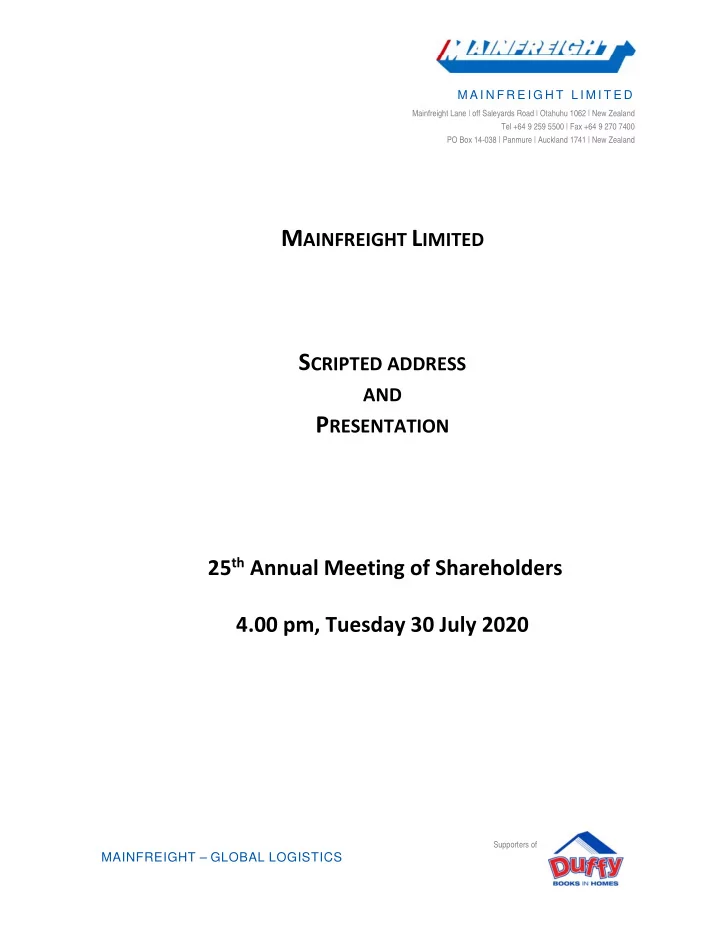

M A I N F R E I G H T L I M I T E D Mainfreight Lane | off Saleyards Road | Otahuhu 1062 | New Zealand Tel +64 9 259 5500 | Fax +64 9 270 7400 PO Box 14-038 | Panmure | Auckland 1741 | New Zealand M AINFREIGHT L IMITED S CRIPTED ADDRESS AND P RESENTATION 25 th Annual Meeting of Shareholders 4.00 pm, Tuesday 30 July 2020 Supporters of MAINFREIGHT – GLOBAL LOGISTICS
CHAIRMAN’S ADDRESS Welcome to our 42nd Annual General Meeting since our beginnings in 1978, and our 25th since listing on the New Zealand Stock Exchange in 1996. The year ended March 2020 produced the continuation of ten consecutive years of record results: 1. Record profits up $15M to $156M before abnormals. 2. Global sales up $141M to $3.1 Billion – that represents sales close to $60M per week. 3. Income tax payable for the year increased by $6M to $61M. 4. The discretionary bonus payable to our worldwide team was unchanged at $27.2M. 5. Our annual dividend paid to shareholders increased by $3M to $59M. The past year was another year of growth and we increased our number of branches worldwide from 260 to 282, and our presence from 24 to 26 countries. We are proud of our growth and achievements in the last 42 years. Climate change, together with the Covid ‐ 19 virus, creates challenges that the world has not faced in living memory. The period ahead is what all of us as individuals, business, governments and countries must attempt to successfully deal with. Fresh drinkable water is one of the world’s climate change challenges; and one of our most valuable and yet neglected commodities, in big and small cities in almost all the countries in which we operate. It may be that the business community in many parts of the world could be a part of the solution to permanently fix local water shortages, in both volume and quality. The answer begins with business collecting all the rainwater, which falls on the roofs of their facilities. To give some idea of how much rainwater is available, at one Mainfreight facility in Auckland we: • Can catch 33 million litres of rainfall per annum with average rainfall of 1250mm. • Use 2 million litres per annum flushing toilets, irrigating gardens and lawns, washing trucks, providing showers, and cafeteria use. - 2 -
• Let 31 million litres flow into the storm water system. • We probably have close to 10 times that catchment area in Auckland when we add in our other facilities, and therefore put 310 million litres of rainwater into the storm water drains, and out to sea, per annum. The difficult part of this proposal is how to harvest such large amounts of storm water for redistribution – but a multitude of solutions could be found. Perhaps the most important advance would be for the business community with large roofs and in areas with fresh water risk, to become self ‐ sufficient for their own water use. A starting point could be for local councils to make it compulsory for new commercial buildings to be self ‐ sufficient for water, and creating a time line for existing businesses to become self ‐ sufficient. In our Annual Report, I said under Social Welfare – “We must commit to housing the poor.” Since writing that sentence, we have seen the appearance around the country of many struggling motels because of a lack of overseas tourists. It would seem an opportunity for councils and government to look at buying appropriate motels and making them permanent state accommodation for the right people. How do we see the year ahead? Your company has so far been fortunate to not have been as seriously affected as those businesses involved in travel and tourism. Almost every year we have to cope with one or more earthquakes, droughts, floods, tidal waves, riots, snow, bush fires or volcanic eruptions occurring somewhere where we operate. We learn from all these, and have been aware for decades that somehow we almost always emerge stronger from them in the longer term. In the last four or five months, three of the many lessons we have learned are: 1. We can sell our services over the phone to new customers. Face to face calls are not always necessary. 2. Our customers are sympathetic to any slightly reduced service levels because we communicate with them. - 3 -
3. Leadership, as we have seen in New Zealand, is vital to deal with serious adverse conditions. Deep in our culture is a strength to challenge and overcome whatever circumstances are put in front of us. We are used to it, we enjoy it, and it is why we come to work. In closing, I would like to acknowledge and thank our global teams. In every area of our operations – from frontline drivers to storemen, transport to sales, reception to administration, cafeteria to training, to new and old management – there is an incredible effort to succeed. Fellow shareholders, I now ask our Group Managing Director, Don Braid –announced at the end of last year as Deloitte’s CEO of the Decade – to give his presentation. Group Managing Director’s Presentation Please refer to separate PowerPoint slide presentation. For further information, please contact Don Braid, Group Managing Director, telephone +64 9 259 5503, +64 274 961 637 or email don@mainfreight.com. - 4 -
Recommend
More recommend